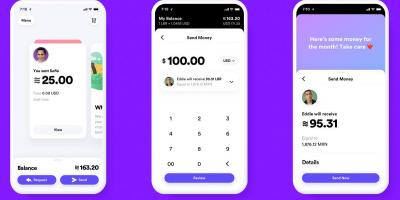Looking for?
Will Libra solve cryptocurrencies’ problems, or create new ones?

From Bitcoin...
Bitcoin is on the rise again, with its value booming from around EUR 3.500 at the beginning of the year to over EUR 9.000 today. However, it is clear by now that even after a decade, Bitcoin has not managed to become a very attractive means of payment. There are three main reasons for that.
- First, there is the scaling issue. Bitcoin was never designed for widespread use. Its implementation of the blockchain technology only allows for a few transactions to be processed per second. This is, of course, not going to cut it if you want to become a globally accepted means of payment. There have been several proposals to amend the Bitcoin protocol to solve the scaling problem, but this leads to the next issue.
- Second, there is the issue of governance. While Bitcoin was of course designed precisely to be consensus-based and to avoid centralized control, this also makes Bitcoin not very agile. There are several groups with conflicting interests, which has even resulted in several hard-forks such as Bitcoin Cash and Bitcoin Gold. Essentially, these forks are groups of people that disagreed with the majority on the Bitcoin blockchain and thus decided to secede.
- Third, there is the matter of value fluctuations. While these of course make for many headlines and are interesting for speculators, they do not make Bitcoin a very stable means of payment. Means of payment need some kind of stability in order to serve as a store of value. Bitcoin can still not serve as such store of value.
...to Libra
Enter Libra. Libra is an initiative of the Swiss-based Libra Association started by Facebook. According to its white paper, it is a cryptocurrency that aims to fix precisely the aforementioned issues that plague Bitcoin.
- First, the Libra Blockchain is aimed to be fully scalable. The goal is to expand the ecosystem, so that new services can continuously be build on top of Libra. According to its white paper, Libra aims to be able to process 1.000 transactions per second.
- Second, it provides governance through the non-profit Libra Association. The Libra Blockchain will therefore be permissioned – though its ambition is to become permissionless in the future – meaning that only the members of the Association can decide on its governance.
- Third, Libra will be backed by a reserve. This reserve will be a basket consisting of bank deposits and short-term government securities, in order to ensure that trust is build in the intrinsic value of Libra. Furthermore, this should keep the value of Libra stable, thus allowing it to serve as a store of value.
The Libra Association takes an impressive start, boasting a range of well-known members such as Facebook, Uber, eBay, Spotify, Vodafone, Visa and Mastercard. It aims to have 100 members by the time of the start early 2020. However, at the moment members wishing to join the Association will need to invest a USD 10 million admission fee.
Essentially, it seems that Libra will remain limited to the Silicon Valley lucky few awash in venture capital. This exclusivity also raises some concerns with regard to competition law. There are a number of other requirements to join the group, but also these can be boiled down to “if you don’t have (real) money, we don’t want you”.
The main goal of Libra is, of course, to provide an alternative payment system. Like Bitcoin, the goal is to provide swift and cheap transaction processing, which should be particularly interesting for the underbanked that do not have access to the traditional financial system.
By Facebook’s Calibra
The main wallet in which the Libra cryptocurrency will be stored is offered by Calibra, a subsidiary of Facebook. This comes as no surprise, given that Facebook is the driving force behind Libra. Until the launch it will also remain in the driving seat, although after that it should take a step back and let the Libra Association run things.
Regulatory issues regarding cryptocurrencies aside, this leads to questions regarding users’ privacy. Given how Facebook is still reeling from a seemingly endless list of privacy scandals – the worst one being Cambridge Analytica – it can be questioned to what extent users will be willing to hand over even more data to Facebook.
And they will need to hand over data. Calibra is already registered as a money services business in the US, meaning that it is subjected to anti-money laundering legislation. Also in the EU it will likely at least become considered as an obliged entity once the Member States have implemented the Fifth Anti-Money Laundering Directive.
As a result, Calibra will in any case need to conduct know-your-customer (KYC) procedures. For this, its Customer Commitment document details that a government-issued ID must be provided to Calibra. Moreover, it will use the latest technologies and techniques, such as machine learning in its AML and KYC processes. This, of course, only raises the stakes in the privacy question.
Data access
The main question here is whether Facebook will gain access to the data of Calibra. While Calibra can function separately from Facebook’s other services – such as WhatsApp and Messenger – it will also be integrated in those apps.
According to Facebook, social data and financial data will remain separate. The Customer Commitment document explicitly states that:
Calibra will not share account information or financial data with Facebook, Inc. or any third party without customer consent. For example, Calibra customers’ account information and financial data will not be used to improve ad targeting on the Facebook, Inc. family of products.
However, even without consent Calibra can still share data with third parties – including Facebook – for fraud prevention, legal compliance, and payment processing. Moreover, Calibra can use Facebook data for those purposes. Only the personalization of Calibra services with Facebook data will only be possible with the user’s consent.
There are, in other words, quite a few instances in which Calibra and Facebook data will be commingled. However, this should only occur for legal purposes – such as the aforementioned AML compliance – and not for advertising purposes. And there will likely also be a possibility to consent to even more data sharing, because people love sharing their personal data, right?
On paper, this may all sound acceptable. The real issue with Facebook is of course that it does not have a very stellar track record with regard to its users’ privacy. While the company is making lots of efforts – or at least doing PR to that end – to improve that situation, it may seem a bit too far-stretched to ask users to trust them this time by giving them even more data.
To be continued
By the looks of it, regulators seem unimpressed. Both US and EU lawmakers have already made clear that they will be following this development from both a financial law and a data protection perspective. Hearings are likely to follow.
Still being some time removed from the actual launch, several elements of the Libra ecosystem are still likely to change. The idea itself is exciting in that it clearly addresses some of the core issues that have prevented other cryptocurrencies – and foremost Bitcoin – from gaining wider adoption as a means of payment.
Getting a collective of tech-titans behind it is also an interesting way to instantly bring cryptocurrencies to their established userbases of billions of users worldwide, although it must be cautioned that this is no guarantee for success. However, the exclusivity of the Libra Association and the unavoidable privacy issues posed by the involvement of Facebook seem to create as many problems as Libra aims to solve.
Image: © Facebook








